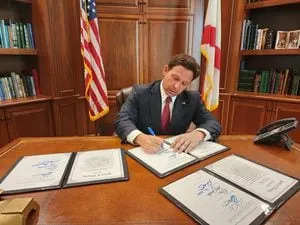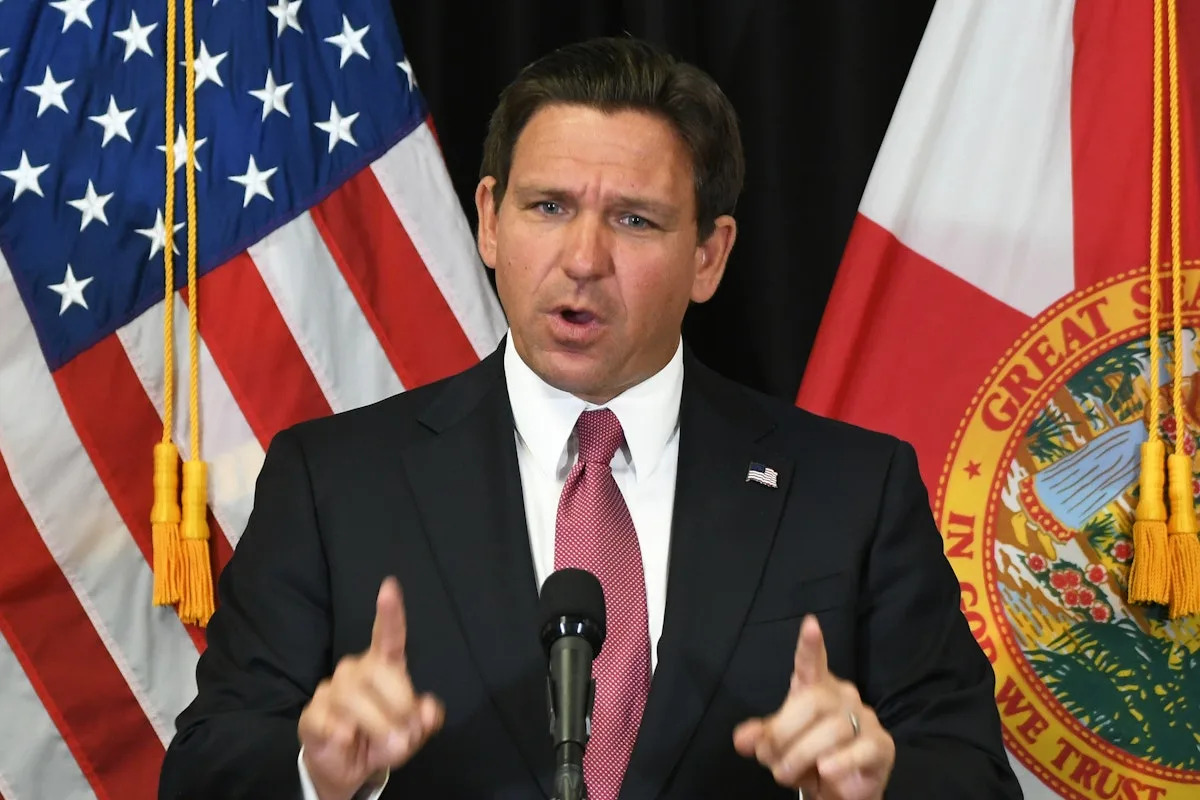Gov. DeSantis signs bill cutting mentions of climate change from state law, bans wind turbines
William Clayton
Wed, May 15, 2024

Florida Gov. Ron DeSantis made waves on Wednesday as he signed into law a contentious energy bill that would remove mentions of the words “climate change” in state statutes, and ban power-generating wind turbines off the state’s coastline.
The proposed bill would remove over 50 lines in state law established in 2008 by then-Republican Gov. Charlie Crist addressing climate change and promoting renewable energy.
READ: Proposed Florida bill could remove majority of mentions to climate change from state law
The energy bill, HB 1645, includes provisions repealing parts of state law mentioning “the potential of global climate change” as a state and energy policy; banning offshore wind energy generation; easing regulations on natural gas pipelines; and eliminating the requirement for Florida state agencies to consider a list of “climate-friendly” products before making purchases.
In a social media statement, DeSantis stressed the bills’ significance, saying they would “keep windmills off our beaches, gas in our tanks, and China out of our state.”
“We’re restoring sanity in our approach to energy and rejecting the agenda of the radical green zealots,” DeSantis stated in a post on X (formerly Twitter).
The bill would also require the Florida Public Service Commission to develop a “cost-effective” energy infrastructure “resilient to natural and manmade threats.”
Currently, pipelines within Florida that are 15 miles or longer require certification under the Natural Gas Transmission Pipeline Siting Act. The bill proposes to change this requirement so it applies to pipelines 100 miles or longer.
The Florida Natural Gas Association reportedly applauded the bill in a news release stating it will “maintain and encourage reliable fuel sources for public utilities, remove federal and international control over Florida’s energy policies, and allow consumers to choose their energy source.”
“This law strengthens natural gas infrastructure resiliency and reliability, which are critical to the state’s economy, the ability to recover from natural disasters and the health, safety, welfare and quality of life of Floridians,” Dale Calhoun, the association’s executive director, said in a prepared statement.
Florida utilities rely heavily on natural gas to fuel power plants, with nearly 74% reliant on power electric generation according to the U.S. Energy Information Administration.
However, the legislation has faced criticism from Democrats and environmental groups, particularly concerning its approach to greenhouse gas emissions.
For example, the bill would eliminate part of the current Florida law that states, “The Legislature finds that the state’s energy security can be increased by reducing dependence on foreign oil. The impacts of global climate change can be reduced through the decrease of greenhouse gas emissions. Additionally, the implementation of alternative energy technologies can create new jobs and employment opportunities for many Floridians.”
The information will be partially replaced by sentences stating, “The purpose of the state’s energy policy is to ensure an adequate, reliable, and cost-effective supply of energy for the state in a manner that promotes the health and welfare of the public and economic growth. The Legislature intends that governance of the state’s energy policy be efficiently directed toward achieving this purpose.”
Senator Tina Polsky (D-Boca Raton) raised concerns in February, highlighting Florida’s vulnerability to climate disasters due to its coastal geography.
“We are surrounded by water, and the effects are showing,” Polsky said.
Despite ongoing concerns about rising sea levels and flooding in Florida, DeSantis’ approach has shifted since he first took office, when Republicans began publicly addressing the effects of climate change.
While campaigning for president in 2023, DeSantis promoted the use of fossil fuels and criticized the “concerted effort to increase fear” of issues such as “global warming and climate change.”
“This is driven by ideology, it’s not driven by reality,” DeSantis said during a September appearance in Texas. “In reality, human beings are safer than ever from climate disasters.”
The DeSantis administration in 2023 additionally turned down over $350 million in federal funding for lowering the cost of making Florida homes more energy efficient.
Another part of the bill will prohibit the construction or operation of offshore wind turbines in Florida-controlled waters and on property within one mile of coastlines. Currently, it is not considered feasible to locate wind turbines in those areas and none currently exist.
Senate bill sponsor Jay Collins (R-Tampa) stated the ban on wind turbines was designed to help protect wildlife and ecosystems and to prevent additional noise.
“Overall, the risk to our flora and fauna, our whales, the ecosystem around there, that’s concerning,” Collins said. “And then the tourism and noise aspect as well is also concerning.”
The bill signing occurred one day after a poll of 1,400 Floridians revealed that 68% of respondents believe the state government should take more action to address climate change. Of those surveyed, 58% attributed climate change to human activity, a decrease from the previous year. The survey also indicated that only 40% of Republicans attributed climate change to human activity.
The governor was supposed to sign the bill in Clearwater Beach, Pinellas County. However, a spokesperson informed the assembled crowd 15 minutes before the scheduled appearance that he would not be there in person due to concerns about the weather.
Ella Nilsen, CNN
Wed, May 15, 2024

As Florida copes with rising seas and record temperatures, lawmakers are going to exceptional lengths to delete many mentions of climate change from state laws in a new bill that Republican Gov. Ron DeSantis signed into law on Wednesday, according to his official X account.
The wide-ranging law makes several changes to the state’s energy policy – in some cases deleting entire sections of state law that talk about the importance of cutting planet-warming pollution. The bill would also give preferential treatment to natural gas and ban offshore wind energy, even though there are no wind farms planned off Florida’s coast.
The bill deletes the phrase ‘climate’ eight times – often in reference to reducing the impacts of global climate change through its energy policy or directing state agencies to buy ‘climate friendly’ products when they are cost-effective and available. The bill also gets rid of a requirement that state-purchased vehicles should be fuel efficient.
“Florida rejects the designs of the left to weaken our energy grid, pursue a radical climate agenda, and promote foreign adversaries,” DeSantis said in a post on X, posting a graphic that said the law would protect the state from “green zealots.”
“What Florida is really doing is saying we’re going to deemphasize any policies that would help mitigate climate change,” said Emily Hammond, a professor of law at George Washington University.
It’s certainly not the first time Republican politicians have deleted the phrase ‘climate change’ – erasing the phrase from government websites was a commonplace activity during the Trump administration. But experts said few other states have passed bills to move away from clean energy and erase climate mentions from their laws.
“It goes further than any other state has gone in repealing its existing climate laws,” Michael Gerrard, founder of the Sabin Center for Climate Change Law at Columbia University, told CNN.
Last year was the hottest year on record for Florida, breaking yet another heat record in the state. South Florida in particular observed scorching heat index temperatures that reached as high as 113 degrees Fahrenheit. Sea levels have risen as much as eight inches higher than they were in 1950, already leading to increased flooding from storms and tides alike.
“Florida is one of the most vulnerable states in the country,” Gerrard said. “All of South Florida is at great peril from sea level rise. They should be the last state to stand in the way of fighting climate change.”
Even as Florida politicians are erasing mentions of climate change from their laws, they are also increasingly focused on helping a storm and flood-prone state withstand climate impacts.
DeSantis and state lawmakers have poured over $1.1 billion into increasing community resilience to flooding and storms, according to a 2023 news release from the governor’s office. In 2019, DeSantis appointed the state’s first chief resilience officer Julia Nesheiwat – who explicitly referenced climate change and sea level rise as a “significant challenge” to the state. (Nesheiwat has since left her post and replaced by the state’s current chief resilience officer Wesley Brooks).
Florida has also accepted millions of dollars in federal funding to help reconstruct a state highway in Miami Beach – elevating the pavement and installing new pump stations to help clear the road of water during flooding events.
When it comes to other federal climate and clean energy funding, however, the state hasn’t been eager to accept. DeSantis vetoed over $29 million dollars in federal energy rebates and energy efficiency grants from the Inflation Reduction Act and Bipartisan Infrastructure Law. Florida was one of five states that declined to compete for $4.6 billion in federal climate grants, although numerous Florida metropolitan areas including Jacksonville, Miami, Fort Lauderdale, and Tampa have raised their hands for the funding instead.
Hammond and Gerrard said this approach from Florida politicians to fund programs dealing with climate impacts without acknowledging its root cause isn’t surprising. Hammond called focusing on adapting to climate change and hardening infrastructure without attribute it to a warming planet “consistent to the conservative approach.”
“They don’t want to acknowledge that climate change is happening; they acknowledge they have flooding,” Gerrard said. “If it’s about moving away from fossil fuels, they don’t like it.”
Opinion
Ron DeSantis Makes “Climate Change Isn’t Real” Official Florida Law
Hafiz Rashid
Wed, May 15, 2024

Ron DeSantis thinks that if the words “climate change” are removed from Florida state law, nobody has to worry about it.
The Florida governor signed legislation Wednesday that would eliminate climate change as a priority in the state’s energy policies set to go into effect July 1. The legislation also takes out most of the references to climate change in Florida law, bans offshore wind, and weakens regulations on natural gas pipelines.
“The legislation I signed today [will] keep windmills off our beaches, gas in our tanks, and China out of our state,” DeSantis told Florida’s Voice, an outlet friendly to the Florida governor. “We’re restoring sanity in our approach to energy and rejecting the agenda of the radical green zealots.”
What’s the point of such a bill? Florida faces many threats from a warming climate, including severe hurricanes, higher temperatures, and rising sea levels and flooding. In many cases, the bill is largely symbolic: the state doesn’t have any offshore wind thanks to low wind speed and its severe hurricanes. Instead, it seems to be just the latest example of DeSantis attempting to gain attention from Republicans nationally through embracing the culture wars.
Previously, DeSantis has passed anti-LGBTQ legislation as well as book bans, and he even banned lab-grown meat despite the industry still being in its infancy. All the while, his popularity has waned in Florida, particularly after he dropped out of the presidential race. This latest bill could put Florida residents at risk from increased weather disasters, while also putting more pressure on the state’s already struggling insurance industry. But DeSantis seems more concerned about his image beyond Florida, and is likely thinking ahead to 2028.
DeSantis, amid criticism, signs Florida bill making climate change a lesser state priority
The Associated Press
Wed, May 15, 2024
TALLAHASSEE, Fla. (AP) — Climate change will be a lesser priority in Florida and largely disappear from state statutes under legislation signed Wednesday by Florida Gov. Ron DeSantis that also bans power-generating wind turbines offshore or near the state’s lengthy coastline.
Critics said the measure made law by the former Republican presidential hopeful ignores the reality of climate change threats in Florida, including projections of rising seas, extreme heat and flooding and increasingly severe storms.
Florida strip clubs: Gov. DeSantis signs bill requiring strippers to be at least 21
It takes effect July 1 and would also boost expansion of natural gas, reduce regulation on gas pipelines in the state and increase protections against bans on gas appliances such as stoves, according to a news release from the governor’s office.
DeSantis, who suspended his presidential campaign in January and later endorsed his bitter rival Donald Trump, called the bill a common-sense approach to energy policy.
“We’re restoring sanity in our approach to energy and rejecting the agenda of the radical green zealots,” DeSantis said in a post on the X social media platform.
Florida is already about 74% reliant on natural gas to power electric generation, according to the U.S. Energy Information Administration. Opponents of the bill DeSantis signed say it removes the word “climate’ in nine different places, moves the state’s energy goals away from efficiency and the reduction of greenhouse gases blamed for a warming planet.
“This purposeful act of cognitive dissonance is proof that the governor and state Legislature are not acting in the best interests of Floridians, but rather to protect profits for the fossil fuel industry,” said Yoca Arditi-Rocha, executive director of the nonprofit Cleo Institute, which advocates for climate change education and engagement.
No rainbow lights: Sunshine Skyway Bridge goes dark for Pride 2024
The legislation also eliminates requirements that government agencies hold conferences and meetings in hotels certified by the state’s environmental agency as “green lodging” and that government agencies make fuel efficiency the top priority in buying new vehicles. It also ends a requirement that Florida state agencies look at a list of “climate-friendly” products before making purchases.
In 2008, a bill to address climate change and promote renewable energy passed unanimously in both legislative chambers and was signed into law by then-Gov. Charlie Crist, at the time a Republican. Former Gov. Rick Scott, now a Republican U.S. senator, took steps after taking the governor’s office in 2011 to undo some of that measure and this latest bill takes it even further.
The measure signed by DeSantis would also launch a study of small nuclear reactor technology, expand the use of vehicles powered by hydrogen and enhance electric grid security, according to the governor’s office.
No comments:
Post a Comment